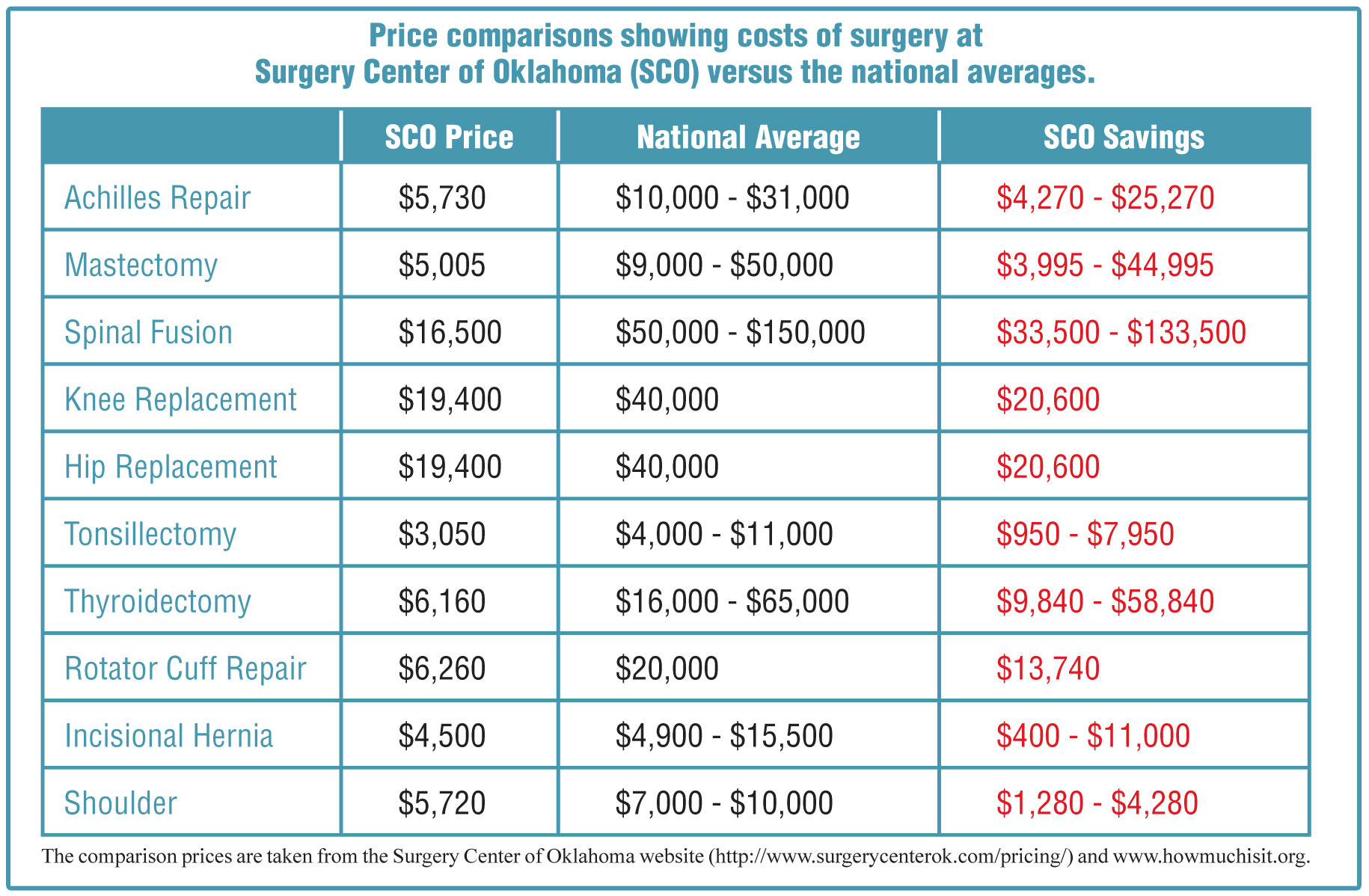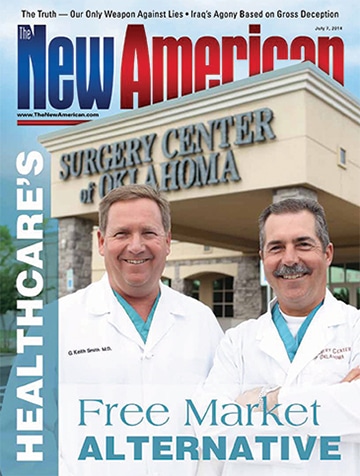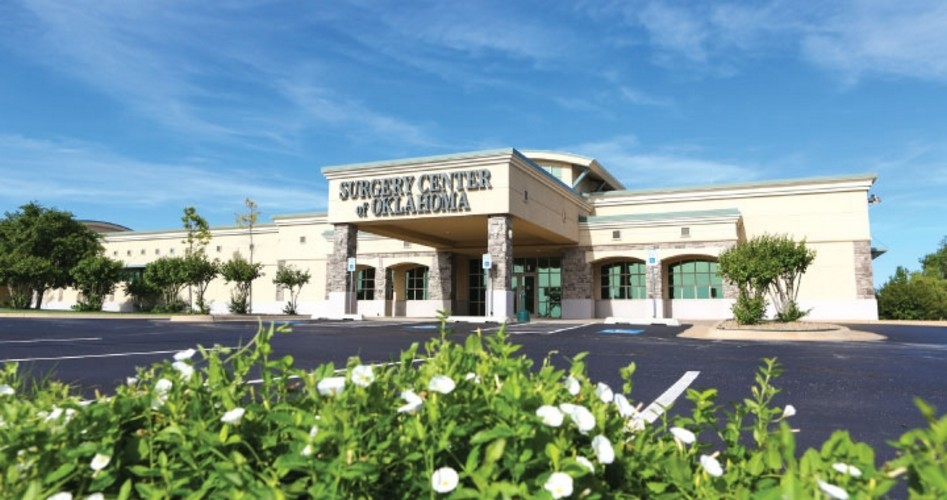Healthcare’s Free Market Alternative
“I called local surgeons and facilities to ask for hernia surgery costs, and never received a firm price, or complete information about what was actually done,” said Bob Singleton of Dallas, Texas. “The verbal estimates (they wouldn’t put them in writing) were in the $5k to $8k range, and that was after their ‘discount’ for cash payment, which was 5 percent.”
Then he checked out the Surgery Center of Oklahoma in Oklahoma City and was pleasantly surprised. The Surgery Center of Oklahoma (SCO) website “gave a fixed price of $3,190 for my surgery,” Singleton recounts. “I called and received all the information I needed. I was able to check the credentials of the surgeon, which were good, and arrange the surgery to happen in less than 2 weeks.” Singleton continues:
I drove down on Sunday afternoon, met with the surgeon on Monday morning, had the surgery just after noon, and spent the night in a nice hotel near the surgery center in the medical district. I returned to Dallas on Tuesday morning. With travel, hotel, and meals included, it was still much less than the lowest estimates I could get in Dallas.
The Surgery Center was polite, efficient, and gave me top-notch care and follow-up. I was better informed and treated in a better facility than any other outpatient facility I’ve used in the Dallas area.
Jennifer Carlsen of Peculiar, Missouri, described her experience with the Surgery Center of Oklahoma as “exceptional.” “Nothing was compromised on service, facilities, or doctors,” she enthused. “Worth our 5 hour drive! Our reason for surgery was a plate & screws removed from collarbone.”
Loren Wissmann of Milford, Nebraska, is similarly effusive in praise of the SCO. “I would highly recommend the Oklahoma Surgery Center,” said Wissmann. “Two years ago I had a double hernia surgery done. It was very friendly and professional service at a fraction of the cost of a normal hospital experience. My surgery was an in/out same day surgery and they followed up on me to make sure I was doing okay.”
Scott Greer of Highland Village, Texas, is another SCO patient who happily endorses the Oklahoma City facility for the tremendous cost savings, as well as the superlative service. The cost differential between SCO and the alternative was “huge,” he says: At SCO, “$3,200 for the surgeon, anesthesiologist, and the facility. Previous surgery center — over $12,000 for the surgeon, anesthesiologist, and the facility. And that was the Blue Cross negotiated rates.”
All of the above-cited testimonials are found on the website of Samaritan Ministries, a Christian healthcare alternative to insurance that now boasts a membership of more than 35,000 member households. Like the tens of millions of American families and millions of other businesses, charities, and institutions, Samaritan Ministries, based in Peoria, Illinois, is scrambling to find quality healthcare at affordable prices for its members. And, like many individuals, companies, and institutions, that search is leading to the Surgery Center of Oklahoma, an innovative facility that has become one of the hottest topics in healthcare.
Founded 17 years ago, SCO is most noted for its “controversial” and “revolutionary” practice of “transparent pricing,” which is to say that SCO provides the potential customer (whether an individual or an institution) with an up-front, honest, all-charges-included price quote for any given surgery, without the notoriously padded, hidden charges that have become the standard sticker-shock experience associated with most hospital stays and out-patient surgeries.
It is not unusual for SCO to provide the same surgery that a patient would get at a hospital across town (or in most facilities across the nation) for one-half, one-fourth, or even as little as one-tenth of the cost. And while the tremendous cost advantage is an obvious reason for choosing SCO for surgery needs, there are other benefits as well. One of those benefits is SCO’s outstanding record of maintaining a zero or near-zero infection rate. In recent years, deadly hospital-acquired infections have been the subject of numerous headlines and investigations. According to the federal Centers for Disease Control and Prevention’s Threat Report 2013, “Each year in the United States, at least 2 million people become infected with bacteria that are resistant to antibiotics and at least 23,000 people die each year as a direct result of these infections.... Most deaths related to antibiotic resistance happen in healthcare settings such as hospitals and nursing homes.” With infection rates at hospitals ranging from four percent to as high as 10 percent, SCO’s virtually non-existent infection rate provides another striking incentive to choose their services.
The Surgery Center of Oklahoma is the brainchild of a pair of visionary physicians, Keith Smith and Steven Lantier, both anesthesiologists, who are passionate about freedom and providing high-quality medical care. They have built SCO into a 32,500-square-foot, state-of-the-art facility with more than 50 top-rated surgeons performing a wide array of surgeries. As skyrocketing healthcare costs have driven up insurance deductibles and co-payments, many individuals, as well as companies with self-funded health programs, have been looking for alternatives. The federally mandated Affordable Care Act (ObamaCare) has accelerated and intensified the search for alternatives. In many cases, people find the out-of-pocket expense for the full cost of surgery at SCO is much cheaper than what they would pay elsewhere, after their insurance deductible and co-payments are figured in. Many companies are finding that it makes sense to recommend SCO to their employees, and are even picking up the entire tab, because SCO saves them money. These are some of the reasons people are coming to Oklahoma City from all 50 states of the United States and many foreign countries to avail themselves of SCO’s medical care.
Honest, Transparent Pricing
Recently, your correspondent journeyed to Oklahoma City to see the SCO firsthand and to interview co-founders Smith and Lantier. Our video interviews with Dr. Smith are available here.
“We’ve been open 17 years this May, and we’ve been quoting prices from day one,” Dr. Smith, the CEO and managing partner of SCO, explained to The New American. “One of the reasons we opened our facility in the first place was, we wanted to be honest in our pricing and we knew that that was not the prevalent mode of operation in healthcare. From the very first day, we would quote prices if people called and asked, ‘How much would it cost to have my hernia fixed?’ I would just call the surgeon and asked him what he thought was fair, and we would quote prices over the phone, not knowing at the time how radical really that was. And it all culminated about five years ago in us just deciding we would put these prices online, knowing that in the healthcare industry in this country, the pricing and quality were not the result of the free market, but it was much more like a cartel or a syndicate, with price fixing and deals that were made where patients wound up in doctors’ offices or hospitals, not necessarily because that was the best place for them, but it was the best decision for the people behind the curtain making the money.”
So, when Drs. Smith and Lantier decided to put SCO’s prices online, says Smith, “part of our thinking was to expose this scam. And as big fans of the free market, we want people to really know and understand that the failure of the American healthcare system is no failure of the free market — it’s an absence of the free market primarily.”
It does not take long to realize that Drs. Smith and Lantier are extraordinarily fervent advocates of freedom and deep thinkers who are well read in economics, politics, philosophy, and theology. They dive into discussions of medical economics with frequent references to Friedrich Hayek, Ludwig von Mises, St. Thomas Aquinas, and Dr. Ron Paul. “I get inspired when I talk with them [Smith and Lantier],” an executive for a multi-billion-dollar corporation, who asked not to be named, told this reporter. “They are exciting! They are actually proving that there is a rational, affordable solution to the healthcare crisis. And I can’t believe how incredibly courageous they are, taking on the political, medical and insurance establishments. And it’s thrilling to see other physicians, politicians, and companies catching their vision. It’s so encouraging to know we can make good healthcare affordable.”
“Healthcare should not be anywhere near as expensive as it is,” Dr. Lantier told The New American, “and it wouldn’t be so expensive without all of the collusion that we see between government and corporate medicine. We prove that here every day, showing that it’s possible to drive down medical costs while raising performance, by getting government interference and government-enabled cartel medicine out of the equation.”
“What we’re doing here should not be that remarkable,” Dr. Smith says. “What we’re doing is what every other industry in the United States does that operates fairly. We say, ‘Here’s what we do and here’s how much it is.’ We identify our costs, build in a marginal profit, and then display those prices. That’s how every other industry works, and it promotes healthy competition and keeps quality high and prices low, and that’s basically how we operate here.”
And the physician-owned SCO not only provides outstanding service at a fraction of the cost of the “not-for-profit” hospitals, and still makes a profit.
“You Get What You Pay For”?
Industry critics like to claim that the unbelievably low surgery prices at SCO are too good to be true and that quality must suffer as a result. “You get what you pay for,” they chide, suggesting that SCO’s surgical care is sub-par. Owing to the spectacular success of SCO, Drs. Smith and Lantier can laugh at those charges now, but these and other attacks hurt the struggling business in its early years. However, many of SCO’s surgeons are prominent physicians who also operate at area hospitals, where they perform the same surgeries, but at the inflated prices. And the proof is in the pudding — for the better part of two decades, SCO has been successfully serving tens of thousands of satisfied patients for a fraction of the cost they would have otherwise paid.
Dr. Smith provides this explanation for the cost discrepancy:
In a normal market economy, you can equate, in most instances, price and quality; there is a relationship that is linear. In healthcare, because the free market is largely absent, it is not a healthy market economy. So, the relationship between price and quality is not what you would think; it is actually inverse because what happens is, where you encounter high prices in healthcare, you typically encounter the monopolistic, syndicate-sort of cartel practices that typically lead to those high prices. Those are situations where, say, one insurance carrier or one giant hospital has complete control over a region, and so they know they are going to get the patients’ business whether they are any good or not. So, they don’t have to pay any attention to quality because they’re assured of that business anyway.
“My saying is that competitive individuals tend to have competitive pricing,” Dr. Smith continues. “If you are a newcomer in the marketplace or if you are just a competitive individual or facility like this, where you want to show that you are better, or you are at least as good, or you’re the best, that competitive spirit lends itself toward competitive pricing.... The less you pay, in all likelihood, the more likely you’re in a competitive environment where various people are competing for the business; and that not only lowers prices, but it keeps quality higher.”
How does SCO manage to keep such an almost unheard of low infection rate? “Part of the reason our infection rate is so low here, is I have virtually no turnover of the staff,” he explains. “Many of the people — in fact all the people that worked for me 17 years ago — are either [still] working here, or they’re completely retired. So, we just don’t have any turnover in our staff. We believe in mutually beneficial arrangements, and that applies to the employment of our staff here, as well. So, when people come to work here, they don’t leave. They just feel like it’s the best job they’ve ever had. People that are working in the same environment every day know the routine, and it just lends to an extremely high-quality experience. That is the reason, primarily, that our infection rate is so low.”
Optimism Under ObamaCare?
How is ObamaCare affecting SCO and how does Dr. Smith think the law will continue to impact his work? “Inadvertently it’s going to wind up being a positive thing for us,” he says. “Rather than tighten the grip on the healthcare system … they’re very unintentionally creating a consumer market, which we are perfectly positioned for and probably years out in front of the curve of anybody else.” “It’s a disaster,” he readily acknowledges, “but the good news is, the central planners never get it right, and they’re not going to get it right with this, either. They’re going to create, and are in the middle of creating, a consumer market that’s very exciting, very healthy, and will bring us back. We have the opportunity to allow this huge mistake to bring us to the right place, which is the economic model of medical practice prior to 1960, where physicians had to look patients in the eye and say, ‘I need $25 for this,’ or had the freedom to say, ‘I’m not going to charge you because I know this is a tough time,’ … knowing that there were reams of paperwork or computer pages to fill out because of that short visit. We have an opportunity to seize that very affordable model, where insurance wasn’t even necessary for the most part. I’m excited; I’m actually very optimistic.”
Drs. Smith and Lantier have good reason for optimism. News of their phenomenal results has been getting out, not only on alternative news websites, but also in the form of major network coverage and in major political and medical circles.
In a May 1, 2014 op-ed, Michael C. Carnuccio, president of the Oklahoma Council of Public Affairs, applauded Oklahoma County for making SCO’s services available to its employees on their health plan. In the first month of coverage alone, SCO saved the county hundreds of thousands of dollars. “It’s time for the state of Oklahoma to reap these same benefits,” wrote Carnuccio. “If Oklahoma lawmakers would incentivize medical price transparency and competition within the state health insurance plan’s providers, it would generate savings at a minimum of $20 million per year. It’s obvious why Oklahoma County and many private businesses are making the shift.”
Among the businesses making the shift is Express Employment Professionals, a major international staffing company headquartered in Oklahoma City. Sam Fox, the director of compensation and benefits for Express, told The New American that he is very excited about the move. “We’re being cautious about making any predictions until we ‘kick the tires’ and see how it runs,” Fox said. “But we think it’s going to be a very good thing for the company and our people; more efficient, less expensive, better service.” He has worked in the health benefits area for 30 years and has seen everything. The SCO model, he says, is the “most positive, encouraging development” in the industry he has seen.
Other physicians are embracing the SCO free market model too. “Dr. Robert Haar in Manhattan has opened up a facility with Regency Health Care,” Dr. Smith notes. “Dr. Bill Grant in Monticello, Virginia, is opening a facility. There are facilities all over the United States that are opening — there is one in Galena, Kansas. We’re going to see a lot of this, because there is a large demand in a market for honesty. Believe it or not, that’s all this is. It’s just honesty in pricing, and now that, I think, a lot of people can wrap their mind around the idea that it’s possible, there is an understanding that there is a market to provide honest healthcare pricing and quality.”
Drs. Smith and Lantier have been spreading the word through speaking engagements, media appearances, and Dr. Smith’s blog (surgerycenterofoklahoma.tumblr.com). They intend to broaden and accelerate the spreading of their hopeful message with their recently launched Free Market Medical Association (FMMA, marketmedicine.org), which they described as the “Match.com” of healthcare.
Among the FMMA’s goals is to provide assistance and support to those physicians or facilities who lack the resources or knowledge to implement the SCO business model. “This consists of access to out-of-the-box-thinking lawyers, web designers and others,” says Smith. “Many employers, unsure about how to amend their health plan language, will find in FMMA the ERISA [Employee Retirement Income Security Act] teams to help them create incentive plans for their employees to seek out the free market physicians and providers.”

Photo: Surgery Center of Oklahoma


